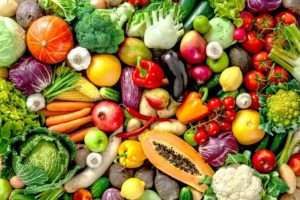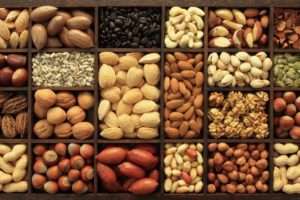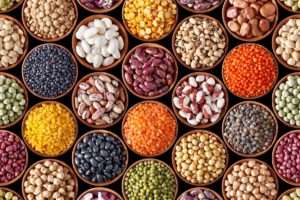Eating healthy is crucial for your overall well-being. It can help prevent diseases, improve your mood, and make you feel better about yourself.
Having a healthy diet is arguably the most important contributors to a long, productive life. It is also one of the easiest parts to neglect. As such, if you are struggling with deciding what are the essential foods to eat, this list will provide some of the best foods for a healthy diet.
In fact, you will discover many nutritious food items that can easily be incorporated into any meal plan or grocery shopping spree! The best part about these foods is that they’re not only healthy – they taste delicious. So go ahead- get started!
- Eating healthy is crucial for your overall well-being. It can help prevent diseases, improve your mood, and make you feel better about yourself.
- List of the best foods to eat for a healthy diet
- 1.Vegetables are essential for a healthy diet
- 2.Fruits have numerous health benefits
- 3.Brown rice/quinoa/millet /buckwheat are healthy grains
- 4.Eat oats as part of a healthy diet
- 5.Nuts and seeds are easy to add to any meal plan
- 6. Legumes are necessary for a healthy diet
- 7.Diary is essential for a healthy diet
- 8.Use healthy oils as part of a healthy diet
- 9.Organic eggs have numerous health advantages
- 10.Seafoods have several health benefits
- 11.Caffeine- in moderation- is a healthy choice
- 12.Vinegar can boost health
- 13.Dried spices or fresh herbs are healthy substitutes
- 14.Starchy vegetables boost energy
- Final words on the best foods to eat for a healthy diet
- Is eating too little calories bad for your health?
- Why is obesity such a big deal?
List of the best foods to eat for a healthy diet
There are many different types of food that can be included in your diet. However, the key is knowing which ones will provide you with the most nutrients and vitamins without compromising your health.
In fact, if you know what foods to include in your diet, it will be much easier for you to eat healthy every single day.
This list includes a few of the best types of food that can eat to improve your health and make you feel great.
Notably, the amount recommended for healthy adults to consume could vary based on several factors including gender, lifestyle, weight etc.
| Vegetables (spinach, broccoli, kale, cabbage) | Whole grains (brown rice, quinoa, buckwheat, oats) |
| Fruits (oranges, apples, cranberries, bananas) | Nuts and seeds (almond, flax seed, hazelnuts) |
| Legumes (peas, beans, lentils) | Diary (milk, cheese, yogurt) |
| Fermented foods (vinegar, pickles) | Spices and herbs (parsley, dill, moringa) |
| Healthy oils (canola, soybean, sunflower) | Starchy vegetables (yams, potato) |
| Caffeine (tea, coffee, cacao) | Proteins (Eggs, Seafood) |
1.Vegetables are essential for a healthy diet
Fresh vegetables, preferably organic, are some of the best foods to eat for a healthy diet.
They are a must have for many reasons – fiber and nutrition being the main ones. Although all vegetables are nutritious, some of the best choices of vegetables to eat include: spinach (very high in iron), broccoli (good source of fiber and vitamin C), kale (very high in iron and Vitamin K), asparagus (good source of fiber, folate, vitamins A and K) and cabbage (good source of fiber, beta-carotene).
The health benefits of eating vegetables include: improved blood sugar control, weight loss, better digestive health and a stronger immune system.

The daily amount of vegetables adults should eat: 2.5 – 3 cups.
"It is health that is real wealth and not pieces of gold and silver." - Mahatma Gandhi
2.Fruits have numerous health benefits
Another large group of food that you should eat as part of a healthy diet is fruits. Fruits are a great source of vitamins and nutrients.
Some of the best choices include: oranges (good source of Vitamin C, fiber and antioxidants), apples (good source of fiber), cranberries (high in antioxidants) and bananas (high in potassium).
Fruits are great for you because they contain many antioxidants that prevent cell damage. They also have high levels of fiber which allow for better digestion.
Notably, fresh, whole fruit is preferable to dried fruit as it has more water content and contains less sugar. Plus, fruit juice contains loads of added sugar, often even more than soda.
Together, fruits and vegetables should make up half of your plate.
The health benefits of eating fruits include: a stronger immune system, a healthy heart and better weight loss.
3.Brown rice/quinoa/millet /buckwheat are healthy grains
Brown rice/quinoa/millet/buckwheat are examples of gluten-free whole grain carbohydrates. These options are very good for digestion and are nutritious foods to add to your meal plan.
In fact, they are very rich in dietary fiber, antioxidants and contain essential amino acids. However, unless medically recommended, sticking to a gluten free diet may be challenging and can have several disadvantages including weight gain and increased risk of type 2 diabetes.
The daily amount of grains adults should eat: 6 ounces of preferably more whole than refined grains.
Notably, examples of refined grains include white rice or white flour.
The health benefits of eating whole grain carbohydrates include: better digestive health, lower risk of cardiovascular diseases and improved glycemic control.
4.Eat oats as part of a healthy diet
Oats are very good for the heart and blood vessels. They contain soluble fiber that lowers cholesterol levels in the body by preventing its absorption into the bloodstream.
This helps to fight obesity and cardiovascular diseases. Oats may also reduce the risk of type 2 diabetes and improve glycemic control in diabetic patients.
The health benefits of oats include: reduced risk of cardiovascular diseases, obesity and type 2 diabetes.
Use this link to discover everything you need to know about breakfast.
5.Nuts and seeds are easy to add to any meal plan
Nuts such as almonds, hazelnuts (good source of vitamin E), walnuts, macadamia nuts (good source of essential fats), pecans, cashews, peanuts, flax seeds, hemp seeds and sunflower seeds are also recommended as part of a healthy diet.
However, unsalted, unprocessed/raw is best if possible. For instance, almonds or hazelnuts can be added to your salad or as a snack instead of chips. Peanut butter is high in nutrients but also in calories.
So, opt for peanut butter with little or no added sugar. Plus, almond and homemade peanut butter is always preferable.
The health benefits of eating nuts include: lower risk of cardiovascular diseases, better weight loss and stronger bones.

The weekly amount of nuts and seeds adults should eat: 5 ounces.
6. Legumes are necessary for a healthy diet
Another one of the best foods to eat for a healthy diet is legume. Legumes such as beans, peas and lentils are essential for a healthy diet since they offer a lot of fiber, protein, iron and other micronutrients.
Legumes belong to both the vegetables and protein subgroup and are often under consumed by adults.
The health benefits of legumes include: improved digestive health, protection against cardiovascular diseases and cancer, better glycemic control and healthier blood vessels.

Weekly amount of legumes adults should eat: 1.5-2 cups.
"Foods high in bad fats, sugar and chemicals are directly linked to many negative emotions, whereas whole, natural foods rich in nutrients - foods such as fruits, vegetables, grains and legumes - contribute to greater energy and positive emotions." - MARILU HENNER
7.Diary is essential for a healthy diet
Dairy products such as milk and cheese are a good source of calcium, protein and vitamin D. As such, they are an essential part of a healthy diet.
Additionally, yogurt with live culture is an excellent source of probiotics that support digestion. There are also low lactose or lactose free diary alternatives available for those who may be lactose intolerant. For adults, low or no fat options are definitely healthier.
The health benefits of consuming dairy products include: healthier bones and lower risk of cardiovascular diseases.
The daily amount of diary required for healthy adults: 3 cups.
8.Use healthy oils as part of a healthy diet
Oils are very good sources of fatty acids and energy. Monosaturated and polyunsaturated vegetable oils (canola, soybean, sunflower) are healthier alternatives than saturated fats such as butter, lard or coconut oil.
Remember that you also get oils from foods such as seafood and nuts so don’t overconsume.
Notably, although there are numerous health benefits of coconut oils including it’s role in burning abdominal fat and increasing energy. Unfortunately, coconut oil has also been shown to have high levels of cholesterol.
The health benefits of healthy oils include: protection against cardiovascular diseases, better weight loss and stronger immunity.

Daily amount of oils required for healthy adults: 22 grams.
9.Organic eggs have numerous health advantages
Eggs are great source of dietary choline that can protect us from cardiovascular disease. They are also rich in cholesterol, vitamin D, selenium and B vitamins.
Actually, organic eggs have been shown to have higher levels of essential vitamins and omega 3 fatty acids than regular eggs.
The health benefits of eating eggs include: protection against cardiovascular diseases, better immunity and healthy nervous system.
The amount of eggs adults should eat is often debated. Some scholars recommend as much as three eggs per day and others as little as 4 eggs weekly.
10.Seafoods have several health benefits
Seafood, including fatty and lean fish, are another one of the best foods to eat for a healthy diet. Notably, herring, salmon, mackerel and sardines are great choices.
Seafood is very rich in essential fats that protect our cardiovascular system especially when eating it raw or rare.
However, pretty much all fish contain small amounts of mercury so limit your intake if you are pregnant or planning to become pregnant soon.
The health benefits of eating fish include: better weight loss, stronger immunity and healthier nervous system.

Weekly amount of seafood to eat for healthy adults: 8-10 ounces.
"Take care of your body, it's the only place you have to live." - Jim Rohn
11.Caffeine- in moderation- is a healthy choice
Caffeine when used in moderation has several health benefits. Notably, this stimulant is present in tea, cacao powder and coffee. Teas are particularly high in antioxidants and have about 3 times less caffeine than coffee.
However, the potency may vary depending on how long it was fermented or dried. But, overconsuming coffee can lead to increased pulse, blood pressure, anxiety, addiction etc.
Cacao powder is an excellent sweetener that also contains antioxidants and lower fats and sugar when compared to regular processed white sugar.
Cacao (unsweetened cacao, dark chocolate etc.) is a good source of flavonoids and theobromine, which have positive effects for heart health, the blood circulatory system and stabilizes mood.
However, try to go for 100 % cacao or over 70 % if possible.
The health benefits of consuming caffeine include: stronger bones, improved cognition and alertness and slower aging.
Daily amount of caffeine a healthy adult should consume: 400 mg and less has not been associated with negative effects.
12.Vinegar can boost health
Vinegar, is a good replacement for table salt (Himalayan pink salt is arguably much healthier than regular salt) and can be added to your salad dressings or sauces instead of sea salt.
Fermented foods such as apple cider vinegar can even assist with digestion and immunity. However, vinegar shouldn’t be consumed excessively due to it’s high acidity. Notably, other fermented foods include pickles and cultured yogurt.
The health benefits of vinegar include: weight loss, improved digestion and protection against cardiovascular diseases.
13.Dried spices or fresh herbs are healthy substitutes
Dried spices and fresh herbs such as basil, dill, parsley and moringa are a much better option than artificial flavors and colors because they contain the micronutrients of the raw food they were derived from and can easily be added to almost any meal.
They also will likely reduce the amount of sodium and sugars you add to your meal.
The health benefits of using dried spices and herbs include: increased antioxidant capacity, better digestion and stronger immunity.

“I believe in the magic of preparation. You can make just about any foods taste wonderful by adding herbs and spices...”— Jorge Cruise
14.Starchy vegetables boost energy
Starchy vegetables such as yams, cassava, corn and potatoes are very good sources of vitamin B6 (pyridoxine), vitamin C and folate as well as iron, magnesium and potassium.
As such, they are important elements of a healthy diet. Folate is especially important during pregnancy to prevent birth defects of the baby’s spinal cord (known as spina bifida).
However, since starchy vegetables tend to increase blood sugar levels, they should be consumed in moderation.
The health benefits of starchy foods include: strong bones, better immunity and improved mood.
Related: List of 5 most unhealthy behaviors to quit ASAP
Weekly amount of starchy vegetables to eat as a healthy adult: 5 cups.
Final words on the best foods to eat for a healthy diet
There are many different types of healthy foods that can be included in any meal. This list included some of the best foods to eat as part of a healthy diet.
The key is knowing which ones will provide you with the most nutrients and vitamins. We hope this list has helped you take the first step in planning your healthy diet.
To get better results, you’ll want to be consistent with eating healthy and exercise as well. Go ahead and get started!
Use this link to read more about why a healthy physical condition is important.
What are your thoughts on the best foods that you should eat for a healthy diet? Let me know in the comments below.
Related Topics
Is eating too little calories bad for your health?
A hormone called leptin is produced by your fat cells to set off the appetite control switch in your brain.
The problem is that when you lose weight, your body thinks you are starving and therefore keeps making more and more leptin.
Eventually this causes leptin resistance which means that the signal from the leptin doesn’t reach the brain properly and so you feel hungry all the time.
Therefore it is a good idea to temper leptin levels by never going too low on your intake of calories.
Why is obesity such a big deal?
Did you know that approximately 74% of American adults and 40% of children and adolescents are overweight or obese? Moreover, obesity is a significant risk factor for heart disease, type 2 diabetes, hypertension and life-threatening cancers etc.
Often, the psychosocial effects of obesity are even more serious. People with obesity are usually subject to social stigmatization, lower income and higher rates of marital dissatisfaction.
Since 1975, the rate of obesity has tripled. In fact, according to the World Health Organization (2021) Obesity is no longer an individual problem but a global epidemic issue.
Use this link to learn more about other physical self-care ideas that you should practice daily.
References
U.S. Department of Agriculture and U.S. Department of Health and Human Services. Dietary Guidelines for Americans, 2020-2025. 9th Edition. December 2020.
World Health Organization (2021) Obesity
Rushana Greenidge-Horace










Leave a Reply